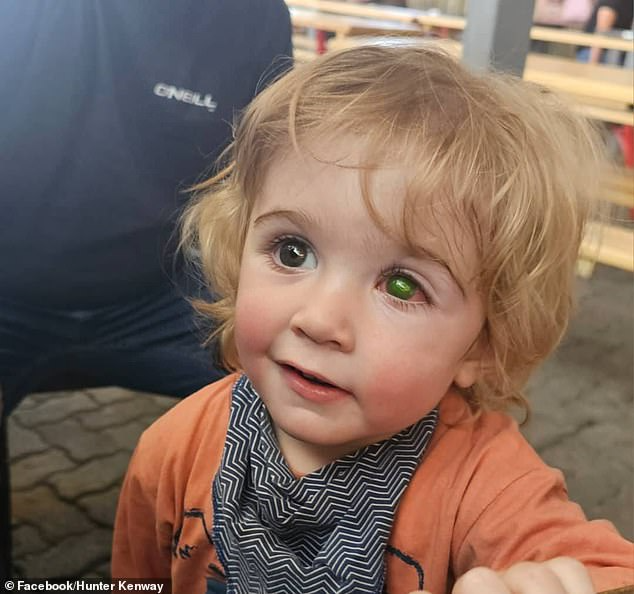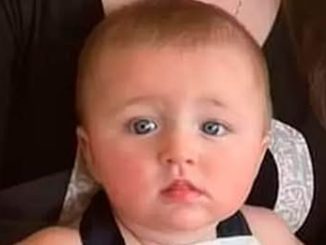
After her son acquired a crippling infection that caused him to lose his left eye, a distraught mother has advised parents to forbid friends and family from kissing their children.
A kiss from a friend spread the herpes virus to Juwan’s eyeball, causing the two-year-old to lose sight in the eye.
His cornea, the transparent outer layer in front of his eye, developed a 4 mm hole as a result of the blister that resulted.
Despite the greatest efforts of the medical staff, the damage was too great, and he lost his vision as a result of the several infections that followed this open wound.
To preserve what was left of the organ, doctors were ultimately compelled to suture his eyelids shut.
As they get ready for a difficult procedure to try to save the toddler’s vision, his family is now speaking out to help others escape the same tragedy.
When Juwan, who was 16 months old at the time, had what his parents initially thought was an eye infection in August of last year, his battle began.
The family sought assistance from their general practitioner, who prescribed antibiotics and sent them home.

Michelle Saaiman, Juwan’s Namibian mother, however, recalls the moment she realized it was something more severe.
We discovered that there was a major issue with the eye two days later. She posted on Facebook, “It appeared as though something was growing inside his eyeball.”
He literally stuck his finger in his eye and scratched his eyeball without even flinching, which is how we knew he had no feeling in his eye.
“Looking at your baby and seeing a 4mm open wound in his eye is the most traumatic experience.”
After several tests and inspections, it was determined that Juwan had a cold sore in his eye that was brought on by the herpes simplex virus.
Since neither of his parents tested positive for the virus, the physicians speculated that the youngster may have contracted it through a kiss from someone who had a fever blister, which is another name for a cold sore.
“The herpes virus could have probably only been spread by someone with an active blister kissing our baby on, near, or on his hand, which he then touched his eye with,” stated Mrs. Saaiman.
The 36-year-old admitted to Metro that at first, she found the diagnosis hard to accept.

“I thought it was an April Fool’s joke, so I was literally staring at the doctor, wondering if it was April 1,” she added.
Juwan’s infection took weeks for medical professionals to control, but by then, the eye damage was already done.
At that point, his cornea was so severely damaged by the herpes that he was basically blind and unable to see anything. He had no sight at all.
It indicated that the brain had ceased to recognize the eye and had ceased communicating with it. The eye dried out when the gel that had been shielding it vanished.
In order to repair the link between the eyeball and the brain, the family is now hoping that an impending operation to move nerves from his leg to his eye socket would go well.
Juwan may be eligible for a corneal transplant, which could restore his vision, if the nerve transfer is successful.
Mrs. Saaiman stated: “We have accepted the possibility that he may be permanently blind in his left eye, but it is uncertain at this time whether any vision can ever be restored.”

“At this point, saving the eye itself and avoiding additional infections are our top priorities.”
She encouraged parents to take action to keep their kids from going through what they did.
“I think it’s important to explain to people why you shouldn’t kiss someone’s baby,” she stated.
We’ve never been overly concerned about this, even though I’ve read it a thousand times. After all, what could really go wrong? False. I was completely mistaken.
The story’s lesson is to never let anyone kiss your child. It’s simply not worth the agony and damage produced by such a foolish virus.
Juwan’s parents have organized a campaign to help pay for their expenditures since they must take time off work to accompany him to specialists in neighboring South Africa.
According to some surveys, seven out of ten Britons suffer from cold sores at some point in their lives. Cold sores are caused by the herpes simplex virus.
Most individuals don’t have any problems with an unattractive active cold sore; the blister goes away on its own or with over-the-counter antiviral medicines.

However, a cold sore can be highly harmful for a small baby as their immune system is yet to fully develop.
If left to spread unchecked, it can begin to harm important organs which can lead to seizures and even death.
Parents are warned that a dangerous herpes infection is most likely to occur during the first four weeks of a baby’s life.
To lessen the risk of spreading the virus, adults with cold sores should avoid kissing their infant and practice proper hand hygiene when providing care.
The NHS cautions that a baby may not get a rash if they do get herpes from a parent or other adult.
Given how rapidly young children can decline, parents are advised to take immediate action if they observe this.
For guidance, parents should speak with their GP or NHS 111.
They should dial 999 right away if the infant is unresponsive and floppy, hard to wake up, has trouble breathing, begins to moan, or if their tongue or skin turns blue.


